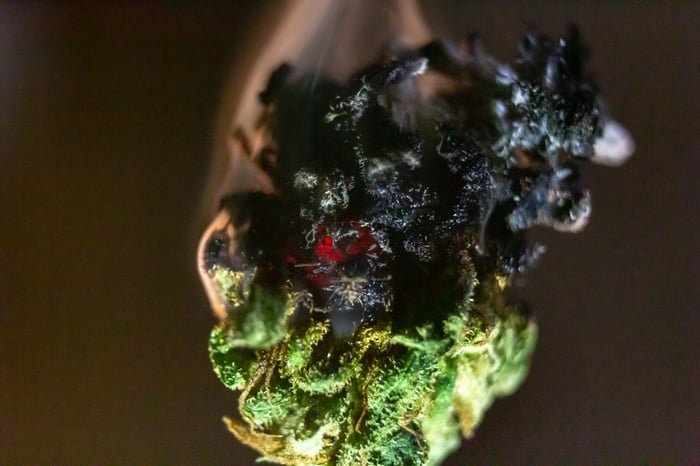Few industries have commanded more interest in recent months than cannabis.
Putting aside the expectation that marijuana will be one of the fastest-growing industries in North America this decade, Wall Street and investors are excited about what's going on in the political spectrum. Democrat Joe Biden is now president, and Democrats have taken control of the Senate following the Jan. 5 Georgia Senate runoff election. With Democrats having a much more favorable view of cannabis than Republicans, and Senate Minority Leader Mitch McConnell (R-Ky.) no longer able to block marijuana legislation from reaching the Senate floor for vote, there's real hope that cannabis reform will occur at the federal level in the U.S.
For U.S. marijuana stocks, legalization could mean the ability to transport cannabis between states, as well as access basic banking services like any other business. Meanwhile, it could allow entry for Canadian pot stocks into the far more lucrative U.S. weed market.
Unfortunately, not all cannabis stocks are going to be winners. As we move into February, I'd suggest avoiding the following three pot stocks like the plague.

Image source: Getty Images.
Aurora Cannabis
As if there were any doubt, Canadian licensed producer Aurora Cannabis (ACB -1.15%) is an absolute fixture of this monthly column.
If there are positives to point out about Aurora Cannabis, it's that the company's new management team is taking cost-cutting more seriously. Five of the company's smaller cultivation facilities were closed last year and two of its largest construction projects were put on hold. When coupled with layoffs and presumed lower per-gram production costs from the ramp-up of larger cultivation facilities, Aurora's cash burn should be considerably lower in the current calendar year than it was last year.
But that's where the good news ends.
The reason Aurora Cannabis should remain off-limits for investors has a lot to do with its precarious cash situation. Since the company's operations continue to result in a net cash outflow, it's had to sell stock on a regular basis to facilitate acquisitions and cover day-to-day expenses. Since June 2014, Aurora's outstanding share count has grown by at least 12,200%; and this includes the $125 million bought deal financing arranged last month. This outstanding share count explosion acts like a cement weight that's holding long-term investors down.
Additionally, both the old and new management team continue to move the goalposts with regard to achieving positive adjusted earnings before interest, taxes, depreciation, and amortization (EBITDA). What's worrisome is that Aurora's debt covenant requires the company to hit positive adjusted EBITDA soon. If lenders become weary of readjusting this covenant, the company's outstanding debt could come due sooner than expected. That's not ideal for a company that keeps burning through its cash on hand.
For now, the story remains the same. Aurora Cannabis is trimming the fat, but it's still nowhere near profitability. Marijuana stock investors shouldn't concern themselves with a company attempting to backpedal into profitability while the rest of the industry is growing by a double-digit rate.

Image source: Getty Images.
Sundial Growers
Penny stock Sundial Growers (SNDL 2.19%) is another cannabis company that investors should be adding to their no-go list in February (and likely well beyond).
Penny stocks and any public company with high short interest have been especially popular in recent months. That's why we've witnessed Sundial more than quadruple in value since early November. The aforementioned victories by Democrats in the U.S. haven't hurt, either, with investors speculating that Sundial will soon have an audience in the U.S. to sell its products.
The biggest problem with Sundial, much like Aurora Cannabis, is that it's drowning its existing investors in share issuances. In order to raise cash and pay down debt, Sundial executed a number of share offerings and debt-to-equity swaps that sent its outstanding share count skyrocketing higher. In fact, the company registered another $100 million share offering just last week. Although its cash situation has vastly improved in the past couple of months, the exponential growth of its outstanding share count offers investors little hope of substantial upside.
To add to the above, Sundial has consistently closed below $1 a share since mid-June. Companies that list on the Nasdaq exchange are required to maintain a minimum list price of $1. In other words, Sundial is at risk of being delisted unless it executes a reverse split. Generally, reverse splits are viewed by Wall Street as a sign of weakness.
If this still isn't enough reason to keep your distance, keep in mind that Sundial also happens to be in the midst of a business transition. Once focused on low-margin wholesale cannabis, the company is switching up its operating model to target retail. This switch won't happen overnight, as evidenced by the company's 46% decline in year-over-year net sales in the third quarter, and 36% net sales decline from the sequential second quarter.
With Sundial Growers nowhere near profitability, it's a speculative pot stock worth avoiding.

Image source: Getty Images.
Canopy Growth
Finally, marijuana stock investors would be wise to avoid the brand-name appeal of Canopy Growth (CGC 1.28%), the only large-cap weed company.
Canopy Growth's size, along with its industry-leading cash hoard of $1.37 billion, have quite a few folks convinced of its success. Plus, spirits giant Constellation Brands (STZ 0.78%) owns a greater than 38% stake in the company, with enough warrants to take its share well over 50%. With Constellation having a vested interest in its success, and former Constellation CFO David Klein now steering the ship at Canopy Growth, it's surrounded by an abundance of optimism.
But there are plenty of reasons to be skeptical. For starters, there's no guarantee that a Democrat-led Congress is going to legalize marijuana at the federal level. Just because McConnell is no longer Senate majority leader doesn't mean cannabis is a top priority. To add, President Biden hasn't suggested he supports recreational legalization. His campaign merely promised to decriminalize and reschedule weed, which isn't the same as legalization. In short, Canopy's entrance into the U.S. may have to wait.
Despite significant cost-cutting activity, including a major reduction in share-based compensation, Canopy Growth is still losing money at an extraordinary rate. Even with record net sales in the fiscal second quarter of more than $135 million Canadian, it generated an operating loss of CA$284.3 million... in three months! Among the billion-dollar cannabis stocks, Canopy Growth might be the last company to reach recurring profitability.
The company's cash situation is also not a secure as you might think. While $1.37 billion sounds great, the company had closer to $4 billion in November 2018, when it closed its largest equity investment from Constellation. Canopy is burning through its cash on hand at an alarming pace, and it simply doesn't provide as much downside protection as it once did.





